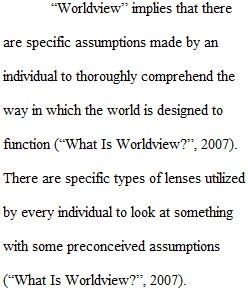


Q WORLDVIEW PAPER INSTRUCTIONS In preparation for the Worldview Paper by completing your textbook readings, you will be equipped to respond by objectively compiling information from a variety of sources to compose a Worldview Paper; applying critical thinking strategies; identifying informal logical fallacies commonly used in argumentation; defining the term worldview; and identifying components of a biblical worldview. (Syllabus MLOs: A, B, and Module/Week 3 LOs 1, 2, 3, 4). Refer to the "Course Policies" in the course syllabus for the formatting expectations in this course. Requirements: 1. Cover page – This is the first page to be included in your paper. (Based on the formatting style that you will be using, see the sample paper in the Writing Style Guide Link). a. APA: For this course, a Summary or Abstract is not required. b. MLA: This format does not require a title page, but does require a specific format for student information on the first page. 2. Content pages – These pages will contain your content and fulfill the requirements as listed below. a. Complete the minimum word count for each Part (I, II, and III). i. Do NOT include the question as part of your word count. ii. Direct quotations must be short and limited. iii. Include your word count at the bottom of each section of the paper (Part I, II, and III). iv. NOTE: Submissions totaling fewer than 300 words will not receive credit. b. Refer to the "Course Policies" in the course syllabus for the formatting expectations in this course. c. Check your work for spelling and grammatical errors. d. Be sure to do your own work; do not plagiarize. 3. Bibliography/References/Works Cited page a. In addition to the in-text citations, a Bibliography/Reference or Works Cited page must be included. b. A minimum of 3 different sources is required. i. Use academic sources for your paper. (For example, do not include blogs, social media, opinion pages, or Wikipedia.) ii. At least 1 of the sources must be outside of the materials used in this course (this would include the Bible, any required reading or videos, and the required textbooks). c. Refer to the "Course Policies" in the course syllabus for the formatting expectations in this course. Content: 1. Fulfill the requirements as listed above. 2. Answer the following questions in 3 clearly separate parts (I, II, and III). I. Part I: (50–100 words total) What is a worldview? Define what the term “worldview” means. Use descriptive phrases to support your definition. II. Part II: (300–500 words total) Articulate the biblical worldview (what is believed) for each of the following 5 questions. Support your biblical content with scriptural support. A minimum of 2 relevant Scripture references need to be included for each of the 5 questions below (do not write out the verses) to support why it is believed. Each of the 5 questions* must be answered in a separate paragraph. 1. The Question of Origin – (What is the origin of the universe etc.? How did humanity come into existence?) 2. The Question of Identity – (What does it mean to be human? Are humans more important than other living things?) 3. The Question of Meaning/Purpose – (What is humanity’s purpose?) 4. The Question of Morality – (What is meant by right and wrong? How is morality determined?) 5. The Question of Destiny – (What happens when a person dies?) *An overview of these specific worldview questions can be found in chapter 4 of Finding Your Worldview: Thinking Christianly about the World. III. Part III: (100–150 words total) Choose 2 of the following questions below and answer them from a biblical worldview belief system. (Use Scripture to support your biblical content.) How might/should a biblical worldview influence the way you… 1. …think about, treat, and speak to others on a daily basis? 2. …vote in local or national elections? 3. …treat/interact with the environment and non-human creation? 4. …decide on a future career (what you will choose and/or how you will carry it out)? Submit this assignment by 11:59 p.m. (ET) on Monday of Module/Week 3.
View Related Questions